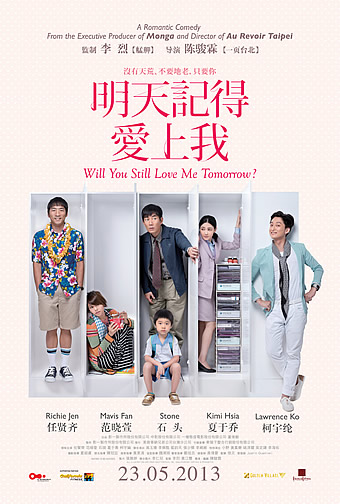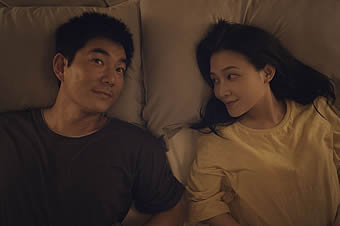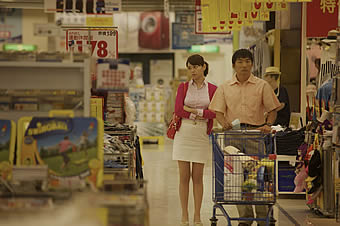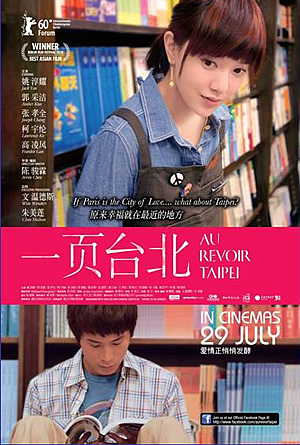WILL YOU STILL LOVE ME TOMORROW? (明天記得愛上我) (2013)
Genre: Drama/Romance
Director: Arvin Chen
Cast: Richie Jen, Mavis Fan, Stone, Kimi Hsia, Stephen Wong Ka-lok, Hae-Woo Lee
Runtime: 1 hr 46 mins
Rating: R21 (Homosexual Theme)
Released By: Festive Films
Official Website:
Opening Day: 23 May 2013
Synopsis: Every wedding photo book exudes sweet romance between the newly-weds. Feng and Weichung’s was no exception. People have always deemed them a match made in heaven. They were each other’s childhood sweethearts, and their puppy love eventually blossomed into a relationship which led them to walk down the aisle at just the right time. Shortly afterwards, they had their son Awan, and it seemed like the young family of three would live happily ever after.
“I am definitely the happiest woman in the world” Feng thinks to herself every morning when she wakes up. Until one day, she notices Weichung’s increasingly unusual behavior, and fears that he might leave her some day and takes away everything. Meanwhile, her sister-in-law, Mandy, also has her own relationship problems with her fiancé, San-San. When Mandy goes shopping with him in a super market one day, she suddenly has a feeling that their relationship might end up in a rut of habitual dependence. Consumed by her insecurity and anxiety, she then decides to bail on him right after their engagement ceremony. What does love and happiness mean? How good it would be if we could keep loving someone forever, until the end of time?
After his first feature, Au Revoir Taipei, Arvin Chen teamed up with executive producer Lieh Li to make this warm and affectionate film. Will You Still Love Me Tomorrow? defies the clichés of romantic comedies and tackles the dilemmas and conundrums in the relationships and lives of modern men and women.
Movie Review:
First things first, despite its marketing, ‘Will You Still Love Me Tomorrow’ isn’t a rom-com. Sure, there are occasional laughs now and then thanks to certain scenes that aim to inject a whimsical tone, but these unfortunately stand out in a movie that otherwise plays as a thoughtful family drama. And if you somehow missed the synopsis, be warned - the drama arises from the gay reawakening of a middle-aged man who has been married for nine years and has a six-year-old son.
We’re not sure any Asian film has so boldly explored such a subject, which will undoubtedly cause some unease among more conservative members of the audience. But if you are willing to put aside your preconceptions, you’ll find that writer/ director Arvin Chen’s follow-up to his charming ‘Au Revoir Taipei’ is in fact a thoughtfully drawn study on repressed sexuality that could well be the very challenge facing some marriages today.
In what is probably one of his most nuanced performances to date, Ritchie Jen plays the gentle and mild-mannered optician Weichung struggling with his sexual identity. A chance meeting at his sister’s engagement party with an openly gay friend from his past, the flamboyant photographer Stephen (Lawrence Ko), forces him to further question if he should embrace his homosexuality. That test comes in the form of a handsome male flight attendant Thomas (Wong Ka-Lok), whom he finds himself drawn to the moment the latter steps into his shop.
Meanwhile, Weichung’s wife Feng (Mavis Fan) wants to have another child, but gets suspicious when he continuously brushes aside her advances in bed. There is also some subplot about a workplace crisis that is meant to make her character realise the possibility of starting over in love, but it comes off more convenient than compelling. What rings true though is her nagging sense of fear and insecurity as her once secure life is threatened by potential upheavals both at work and at home. In particular, her outburst when she confronts Weichung about his sexuality is particularly heartfelt - and even as we feel for Weichung who has had to hide his true nature in a society largely disapproving of it, we also empathise with Feng who has to bear the consequences of his deception.
Despite the potential heavy-handedness of the topic, Chen never quite lets it get overly dramatic or in fact melodramatic. Instead, he sustains a light breezy tone that fits in with the wave of new-age rom-coms that Taiwanese cinema has produced in recent years. Much as one would be tempted to bill this a coming-out film, it isn’t; rather, Chen reflects on the inherent tensions within modern-day Asian societies, as evolving cultural attitudes towards homosexuality seem to be at odds with its traditional emphasis on marriage and children. This is portrayed both in Feng’s set of overbearing parents who consistently pester her to have another child, and also in an otherwise unnecessary side plot that sees Weichung’s sister Mandy (Kimi Hsia) re-examining her impending marriage to fiancé San-san (Stone).
Both Weichung and Mandy’s troubles are drawn along the lines of romantic fulfilment, the latter’s cold feet just before her wedding because of her uncertainty if a life of routine with the dependable but unromantic San-san is indeed what she wants. Neither as meaningful nor as consequential as Weichung’s marriage woes, it serves largely two purposes - one, to provide a more mainstream and therefore more palatable romance in line with a conventional rom-com; and two to give more screen time to Stephen and his quartet of gay friends, who assist him in winning her hand back.
And thanks to a delightful performance by Lawrence Ko, you’re not likely to object to the arguably weakly plotted romantic travails of San-san and Mandy, made more agreeable too by the endearing performances of Stone and Kimi Hsia, both of whom are making their feature film debuts here. But the movie belongs to Jen and Fan, both pop singers never thought to be serious actors till now. Jen is beautifully subdued in his portrayal of Weichung and in his scenes with Hong Kong actor Wong Ka-lok share an engaging chemistry that effortlessly convinces you of their mutual attraction. Nicely complementing Jen is Fan’s exercise in restraint, nicely calibrated to convey her character’s growing sense of anxiety.
Yes, the uniformly impressive performances are one reason why Chen’s movie proves to be unexpectedly affecting. It is also best regarded as a movie of two halves - the first conforming more to the formula of a standard fluffy rom-com, and the second a touching family drama that works as an honest and refreshing look at sexual repression in a society whose norms and values are transitioning from a conservative past. Like we warned you at the start, this won’t be comfortable viewing for some people, so make sure you get your expectations right before you step into this flawed but nonetheless inspired romantic dramedy.
Movie Rating:




(Far from your typical rom-com, this thoughtful and poignant exploration of romantic discontent and sexual fulfilment boasts career-best performances from Ritchie Jen and Mavis Fan)
Review by Gabriel Chong
You might also like:

Movie Stills








